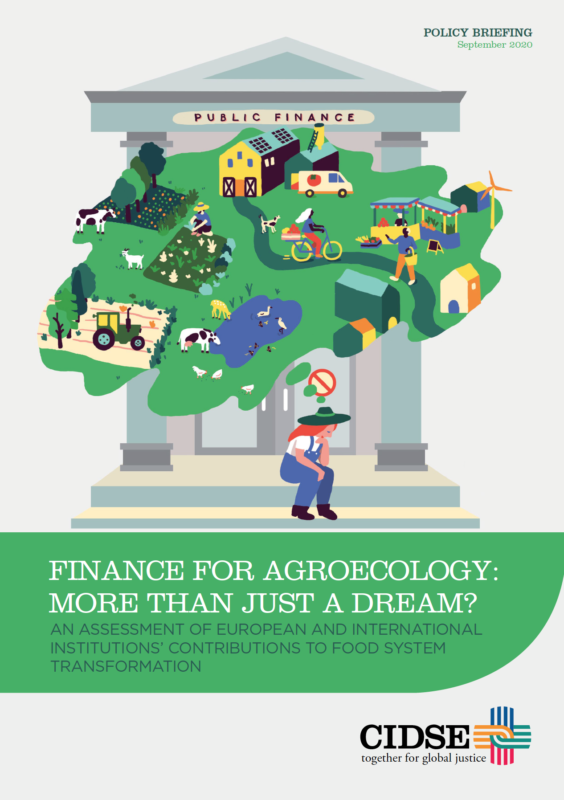Webinar on why an agro-ecological transformation of agri-food systems makes sense and how agro-ecology contributes significantly to mitigating and adapting to climate change, stemming biodiversity loss, as well halting and reversing land and water degradation.
The specific objectives of this series are for participants to:
- Enhance their knowledge and understanding of the Green Deal’s main priority areas, focusing on climate change, Disaster Risk Reduction, biodiversity, circular economy, “greening”/mainstreaming and sustainable finance: state of play, latest policy developments and implications for EU cooperation;
- Understand how “Greening EU cooperation (Environment and Climate Change)” – particularly at the stage of programming for 2021-2027 and aligning it with the Paris Agreement – contributes to the implementation of the external dimension of the Green Deal and the new policy agenda for development cooperation, environment and climate change;
- Understand basic concepts related to mainstreaming of environment, biodiversity, climate change and disaster risk reduction and their linkages with development in different sectors;
- Understand the entry points, opportunities, challenges and key tools for integrating environment, biodiversity, climate change and disaster risk reduction in the EU cycle of operations – with particular focus on programming for 2021-2027;
- Understand what is agroecology and how it can be used to achieve climate, environment and biodiversity commitments of the Green Deal while also meeting the Farm to Fork Strategy’s objectives;
- Enhance participants’ understanding of how agroecology main concepts and applications can be integrated in future programmes.
- How agroecology supports, and is supported by Policies
- Why an agroecological transformation of agrifood systems necessary is needed
- How agroecology contributes to mitigating and adapting to the climate crisis, stemming biodiversity loss and halting and reversing land and water degradation.
- Fergus SINCLAIR. Fergus Sinclair leads the World Agro Forestry Centre's research into the contribution that trees can make to the productivity of farming systems and the lives of rural communities.
- Emile FRISON. Emile Frison. is an expert on conservation and agricultural biodiversity who has headed global research-for-development organisation Bioversity International
Presentations:
Shared resources by the speakers
- The Transformative Partnership Platform on Agroecology project
This project supported by CGIAR aims to better understand the socio-economic viability of agroecological practices, and their livelihood system impacts across various environments and demographics in Africa.
Often agroecological approaches involve more labour - so the question becomes what are the returns to that labour - this is a focus of the TPP viability project funded by France - intensifying in relation to knowledge and labour often is gender differentiated - Paper from Kenya for some concrete examples 1) Crossland, M., A. M. Paez Valencia, T. Pagella, C. Magaju, E. Kiura, L. Winowiecki and F. Sinclair (2021). Onto the farm, into the home: how intrahousehold gender dynamics shape land restoration in eastern Kenya. Ecological Restoration 39 (1&2): 90-107. 19 pp.
- Sinclair, F., Wezel, A., Mbow, C., Chomba, C., Robiglio, V., and Harrison, R. (2019). The contribution of agroecological approaches to realizing climate-resilient agriculture. Background Paper. Global Commission on Adaptation. Rotterdam. 46 pp.
- HLPE 2019. Agroecological and other innovative approaches for sustainable agriculture and food systems that enhance food secu rity and nutrition. A report by the High Level Panel of Experts on Food Security and Nutrition of the Committee on World Food Security, Rome
Resources shared by attendees:
- T. Wise (2021) Throwing good money after bad: Failing Green Revolution program readies billion-dollar fund drive
- Euractiv Agroecology transitional costs major hurdle to uptake, warns French advisory body
- EC's Ethics Group calls for wide-ranging societal debate and global governance
- P. Bottazzi, S. Boillat, F. Marfurt and S.M. Seck (2020) Channels of Labour Control in Organic Farming: Toward a Just Agroecological Transition for Sub-Saharan Africa, MDPI 22 pp.





No comments:
Post a Comment